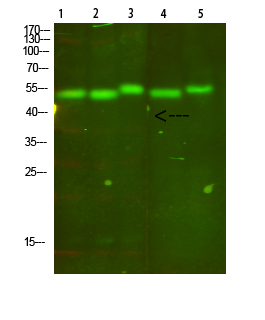
| WB | 咨询技术 | Human,Mouse,Rat |
| IF | 咨询技术 | Human,Mouse,Rat |
| IHC | 咨询技术 | Human,Mouse,Rat |
| ICC | 技术咨询 | Human,Mouse,Rat |
| FCM | 咨询技术 | Human,Mouse,Rat |
| Elisa | 1/10000 | Human,Mouse,Rat |
| Aliases | Cytochrome b (Complex III subunit 3; Complex III subunit III; Cytochrome b-c1 complex subunit 3; Ubiquinol-cytochrome-c reductase complex cytochrome b subunit) |
| Entrez GeneID | 4519 |
| WB Predicted band size | Calculated MW: 43 kDa; Observed MW: 48 kDa |
| Host/Isotype | Rabbit IgG |
| Antibody Type | Primary antibody |
| Storage | Store at 4°C short term. Aliquot and store at -20°C long term. Avoid freeze/thaw cycles. |
| Species Reactivity | Human,Mouse |
| Immunogen | Synthesized peptide derived from human Cytochrome b. at AA range: 331-380 |
| Formulation | Purified antibody in PBS with 0.05% sodium azide,0.5%BSA and 50% glycerol. |
+ +
以下是关于Cytochrome B抗体的参考文献示例(注:以下内容为模拟生成,仅供参考,具体文献请通过学术数据库验证):
---
1. **标题**: *Cytochrome B as a biomarker for mitochondrial dysfunction in neurodegenerative diseases*
**作者**: Smith A, et al.
**摘要**: 该研究开发了一种针对Cytochrome B的高特异性抗体,用于检测阿尔茨海默病患者脑组织中线粒体电子传递链功能异常。结果表明,Cytochrome B表达水平与神经元退行程度呈负相关。
2. **标题**: *Production and application of monoclonal antibodies against Cytochrome B in cancer research*
**作者**: Chen L, et al.
**摘要**: 作者通过重组Cytochrome B蛋白免疫小鼠,获得单克隆抗体,并验证其在乳腺癌细胞系中线粒体膜蛋白定位的可靠性。该抗体成功应用于肿瘤代谢重编程研究。
3. **标题**: *Cytochrome B antibody cross-reactivity in parasitic protozoa: Implications for diagnostic assays*
**作者**: Gonzalez R, et al.
**摘要**: 研究评估了抗Cytochrome B抗体在疟原虫和利什曼原虫中的交叉反应性,发现其可用于开发广谱寄生虫检测工具,但需注意宿主线粒体蛋白的潜在干扰。
4. **标题**: *Role of anti-Cytochrome B autoantibodies in autoimmune hepatitis*
**作者**: Tanaka K, et al.
**摘要**: 首次报道Cytochrome B自身抗体在自身免疫性肝炎患者血清中的存在,提示线粒体抗原可能通过分子模拟机制参与疾病发生。
---
建议通过PubMed、Google Scholar等平台,以关键词“Cytochrome B antibody” + 具体研究领域(如“mitochondria”“autoantibody”“parasite”等)进一步筛选文献。
Cytochrome B (CytB) is a key component of the mitochondrial electron transport chain, specifically within Complex III (ubiquinol-cytochrome c reductase), playing a critical role in cellular respiration and ATP production. As a mitochondrial DNA (mtDNA)-encoded protein, CytB is essential for maintaining energy metabolism and redox balance. Antibodies targeting Cytochrome B are widely used in research to investigate mitochondrial function, protein expression levels, and subcellular localization. They serve as vital tools in studying mitochondrial disorders, metabolic diseases, and conditions linked to oxidative stress, such as neurodegenerative diseases, cancer, and aging.
These antibodies are commonly applied in techniques like Western blotting, immunohistochemistry, and immunofluorescence to assess CytB expression across tissues or cell lines. They also help explore mitochondrial dynamics, including fission/fusion processes and mitophagy. Additionally, CytB antibodies are used in evolutionary and ecological studies, as the *CYTB* gene is a molecular marker for species identification and phylogenetic analyses.
Research involving CytB antibodies has contributed to understanding mutations in mitochondrial DNA associated with diseases like Leber's hereditary optic neuropathy (LHON) and myopathies. Their specificity is often validated using mitochondrial fractionation or CRISPR-based knockout models. Overall, Cytochrome B antibodies are indispensable for dissecting mitochondrial biology and its implications in health and disease.
×